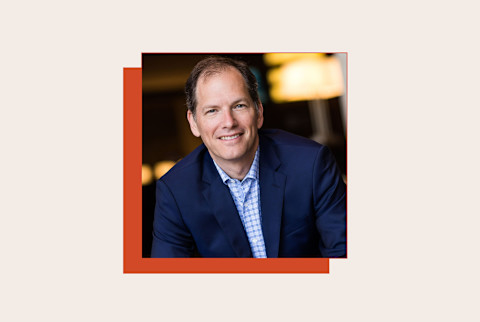The Sleep Doctor's Guide To Optimizing Your Rest, Hydration & Breath

In a world where wellness often feels like a maze of complex routines and conflicting advice, Michael Breus, Ph.D.—widely known as "The Sleep Doctor"—offers a refreshingly straightforward approach. Breus emphasizes a no-nonsense philosophy to better health: optimize your sleep, hydration, and breath, and watch everything else fall into place.
As a diplomate of the American Board of Sleep Medicine and a fellow of the American Academy of Sleep Medicine, Breus has spent decades studying how simple habits can transform health. His message is clear: Health doesn't have to be overwhelming—it's about mastering the three basics: Sleep smarter, hydrate better, and breathe deeper. Here's how to do all three:
1. Sleep smarter: Building the foundation
Sleep is the cornerstone of overall well-being and is often the first thing we sacrifice when life gets busy. However, Breus reminds us that quality sleep is essential for physical restoration, mental clarity, and emotional balance.
- Sleep according to your chronotype: Are you a night owl or an early bird? Your chronotype determines your natural sleep-wake cycle. Aligning your sleep schedule with your chronotype is one of the easiest ways to optimize rest.
- Wake up at the same time every day: This might be the single most impactful change you can make. Waking up consistently sets your internal clock and helps regulate melatonin production. Breus warns that trying to "catch up" on sleep over the weekend won't work the way you think—it disrupts your biological rhythm and can make you feel groggy.
- Address underlying issues: If you're struggling with sleep, don't assume it's just stress or a busy schedule. Sleep is often a window into deeper health issues, such as caffeine overuse, nutritional deficiencies, alcohol consumption, or even sleep disorders like sleep apnea. Identifying and addressing these root causes is key to long-term improvements.
Create a sleep-friendly environment
Your sleep environment plays a significant role in the quality of your rest. To promote better sleep, Breus recommends making adjustments to your bedroom:
- Room temperature: Your body's core temperature naturally drops when you sleep. This drop is essential for falling asleep. To facilitate this process, ensure your bedroom is cool and opt for lighter sleepwear.
- Electronics and light: While many experts advise avoiding electronics before bed, Breus takes a more flexible approach. The key factor is stimulation. Watching a lighthearted show or reading a relaxing book before bed is less disruptive than engaging in a highly stimulating activity, like playing video games or watching an intense movie.
- Make it dark: Melatonin is produced in darkness, so it's crucial to sleep in a dark room. Use blackout curtains or wear a sleep mask to minimize light exposure.
2. Hydrate better: The often-overlooked factor in sleep and well-being
We all know that hydration is essential for health, but many of us don't realize just how much it impacts sleep quality. Breus emphasizes the importance of hydration for maintaining proper bodily functions and improving sleep. Here's how to hydrate smarter:
Sipping is better than gulping
When you wake up, your body is like a dry sponge. If you drink too quickly or in large amounts, your body cannot absorb the water effectively. Instead, sip water slowly throughout the morning to ensure your body can fully absorb the liquid and rehydrate.
Stay consistent throughout the day
Hydration shouldn't be a last-minute attempt before bed. Breus recommends spreading your water intake throughout the day. This helps your body absorb the water without overwhelming your system right before sleep. Drinking too much water at night can lead to waking up to use the bathroom, disrupting your rest.
Know when you're hydrated
Hydration isn't about how much you drink—it's about how well your body absorbs it. Breus suggests checking the color of your urine to gauge your hydration levels. If it's clear or light yellow, you're well-hydrated. Dark yellow or amber-colored urine is a sign that you need more fluids.
Breus also recommends the "skin pinch test" to check hydration. Pinch your skin gently and let go. If it returns to normal within two seconds, you're properly hydrated. If it takes longer, it's time to drink more water.
3. Breathe deeper: The power of intentional breathwork
Breathing may be automatic, but most of us don't do it as effectively as we could. Breus explains how mastering your breath can have profound effects on your physical and mental well-being. Intentional breathing can regulate your autonomic nervous system, toggling between the active "fight-or-flight" mode and the restful "rest-and-digest" state.
Breathwork for stress relief
Simple breathing exercises, such as deep belly breaths, can lower stress and prepare your body for restful sleep.
The sleep-breathing connection
Poor breathing during sleep, like snoring or obstructive sleep apnea, can severely impact health. Breus recommends getting tested if you suspect sleep apnea. Convenient at-home tests are now available, making diagnosis easier than ever.
The ultimate morning routine: The 3-15s
Breus's morning routine is designed to set you up for a day of optimal health. His "3-15s" routine is simple yet powerful:
- 15 deep breaths: This helps activate the respiratory system and flood your body with oxygen.
- 15 oz. of water: Hydrate your body to start the day right.
- 15 minutes of sunlight: Exposure to natural light helps reset your circadian rhythm and signals to your body that it's time to wake up.
The takeaway
At the end of the day, Breus' philosophy boils down to radical simplicity: Master the basics—sleep, hydration, and breath—and watch your overall health improve. Breus reminds us that health doesn't have to be complicated; it starts with small, intentional steps. Embrace these foundational practices, and you'll find that the path to true well-being is not only accessible but also transformative.
